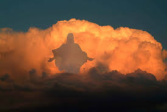
- Rainer Maria Rilke (Adapted for worship)
READING
Later on that day, the disciples had gathered together, but, fearful of the Jews, had locked all the doors in the house. Jesus entered, stood among them, and said, “Peace to you.” But Thomas, sometimes called the Twin, one of the Twelve, was not with them when Jesus came. The other disciples told him, “We saw the Master.” But he said, “Unless I see the nail holes in his hands, put my finger in the nail holes, and stick my hand in his side, I won’t believe it.” Eight days later, his disciples were again in the room. This time Thomas was with them. Jesus came through the locked doors, stood among them, and said, “Peace to you.” Then he focused his attention on Thomas. “Take your finger and examine my hands. Take your hand and stick it in my side. Don’t be unbelieving. Believe.” Thomas said, “My Master! My God!” Jesus said, “So, you believe because you’ve seen with your own eyes. Even better blessings are in store for those who believe without seeing.” Jesus provided far more God-revealing signs than are written down in this book. These are written down so you will believe that Jesus is the Messiah, the Son of God, and in the act of believing, have real and eternal life in the way he personally revealed it.
- John 20:19, 24-31 (The Message)
REFLECTION
In a recent discussion over coffee with a friend I expressed reservations about a project he wanted to undertake, and he responded by calling me a Doubting Thomas. And – you know what? - it didn’t sound to me like a compliment. Most of us, in fact, think of doubt as something shady, dubious, unhealthy, or just plain dirty. We think of doubt as the beginning of a slippery slope careening off the narrow way. It may be a road less taken, but that’s okay because it’s not a road worth traveling. This is harsh stuff, no doubt (pun intended; I couldn’t resist), but perhaps this dark assessment of doubt explains why I was conditioned to feel guilty, even ashamed, for expressing doubt by the Southern-fried Fundamentalist Church in which I was raised.
I reckon I should confess that I didn’t prove to be an outstanding representative of this proud religious heritage. To me, doubt didn’t feel dirty from the inside out; that was imposed on me from the outside. For me, doubt was simply a necessity. It was there no matter how hard I tried to walk the walk of a fundamentalist and root it out with piety and stubborn belief. And in the end it was not a bad thing. In fact, it was only when I embraced my doubts and questions that they began to open out to spiritual insight, strength, and growth in the Spirit of which I was incapable before.
I think Thomas, commonly dubbed Doubting Thomas, would understand my plight; I think he experienced something quite similar in his spiritual life; and I think that this passage from John 20 reveals the origins of a spiritual giant that can serve as role model for faith. Faith, that is to say, that develops not in spite of, but through doubt. To be perfectly honest, I think the moral of this story is as simple as it is overlooked – doubt saves the day.
Before his encounter with the risen Lord, Thomas suffered from the same fears that drive many of us. He wanted hard proof of this claim of resurrection before he would be willing to risk anything on it. He didn’t want to christen anything as true unless he could feel it, touch it, probe it, and in so doing clearly define it, limit it, and make it manageable.
Please note, however, that when Jesus invited Thomas to touch, probe, and feel resurrection life… he declined, and exclaimed in near ecstasy, My Master! My God! His fear had vanished, and solid, earthbound evidence had become inadequate, even superfluous. Thomas’ doubt was transformed in the presence of resurrection life into what could be called caution in the face of mystery. His questions, his reservations, were not barriers to faith. Rather, they reflected his recognition that what he sought was beyond his understanding; it was beyond his control, that he had nothing to give to resurrection life, but had only to receive its fullness.
Like Thomas I say, Give me doubt or, to express it more forcefully, I doubt therefore I believe. Doubt as skepticism that is dubious of the strange, the new… not so much. Doubt as cynicism that is fundamentally distrustful of the motives and goals of others… not so much. Give me doubt that entices me beyond the narrow limits of my truth, my understanding, and my conclusions to something mysterious and wonder-full. Something like resurrection life.

 RSS Feed
RSS Feed



